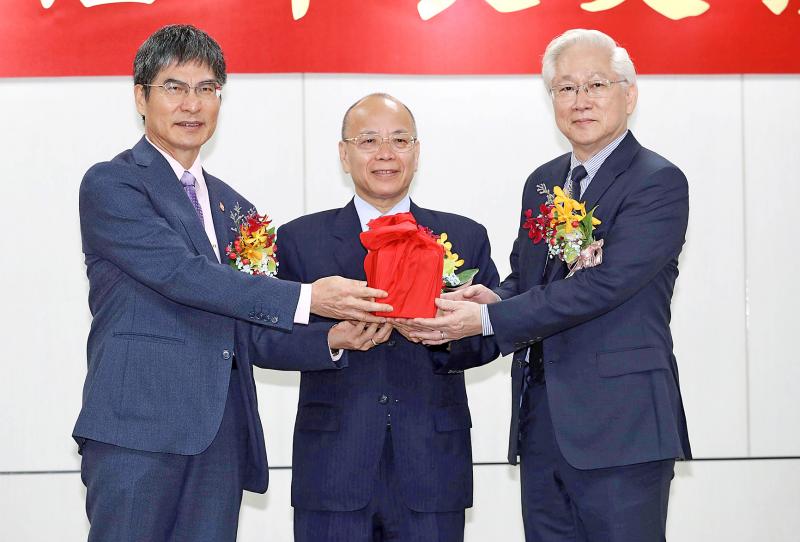Promoting biotechnology, semiconductors and digital transformation are the key to creating an innovative, inclusive and sustainable society by 2030, Minister of Science and Technology (MOST) Wu Tsung-tsong (吳政忠) said yesterday as he took office.
Wu, 65, an expert on applied mechanics, served as a minister without portfolio, overseeing tech-related policy, since President Tsai Ing-wen (蔡英文) took office in 2016.
Prior to that, he was a convener of the technology division of the New Frontier Foundation, a think tank linked to the Democratic Progressive Party.

Photo: CNA
He assumed office at a ceremony at the Ministry of Science and Technology in Taipei overseen by Minister Without Portfolio Chang Jing-sen (張景森), as his predecessor, Chen Liang-gee (陳良基), handed him the seal of office.
Chen laid the critical foundation for promoting innovation and startups, basic research and training international talent, as he had pledged to when he took office in February 2017, Wu said.
He would continue Chen’s policies, and aim to make Taiwan an innovative, inclusive and sustainable society by 2030, Wu said.
The goals are to solve problems generated by the aging society, declining birth rate, a widening wealth gap, environmental changes and insufficient energy supply, as well as tackle the challenges posed by new social modalities, which require considerations about socio-economic, environmental and political changes, he said.
Wu named six development directions — biotechnology and precision health initiatives, more advanced semiconductors, digital transformation, 6G networks that involve the applications of low-orbit satellites, boosting cybersecurity capability, and improving Internet connections among public and private sectors — that he had planned during his time as a minister without portfolio.
Praising Hsinchu-based Taiwan Semiconductor Manufacturing Co (TSMC) as the “pride of Taiwan,” Wu said the ministry would work with the company and research institutions to develop semiconductors measured in angstrom units to build a “smart nation.”
Ministry executives and officers on Tuesday afternoon threw a farewell party for Chen that lasted for more than three hours.
He was proud of having helped keep TSMC’s 3-nanometer fab in Tainan, the launch of two satellites — the remote sensing satellite Formosat-5 in 2017 and Formosat-7/COSMIC2 constellation for weather observation last year — and three new research vessels, said Chen at the party.
Chen, the longest-serving technology minister thus far, said that he regretted having to cancel a headhunting trip that had been planned for late March, due to the COVID-19 pandemic, he said.
Chen said he planned to return to research at National Taiwan University.
In related news, Deputy Minister of Science and Technology Shieh Dar-bin (謝達斌), an expert in oral medicine, and Vice Minister of Science and Technology Tsou Yu-han (鄒幼涵), a long-time ministry official, have been retained in their posts.
Former deputy minister Hsu Yu-chin (許有進), recruited by Chen from Synopsys and responsible for promoting startups, has been replaced by Deputy Minister of Science and Technology Lin Minn-tsong (林敏聰), a physicist, who had been director-general of the ministry’s Natural Sciences and Sustainable Development Department.

Taiwan has received more than US$70 million in royalties as of the end of last year from developing the F-16V jet as countries worldwide purchase or upgrade to this popular model, government and military officials said on Saturday. Taiwan funded the development of the F-16V jet and ended up the sole investor as other countries withdrew from the program. Now the F-16V is increasingly popular and countries must pay Taiwan a percentage in royalties when they purchase new F-16V aircraft or upgrade older F-16 models. The next five years are expected to be the peak for these royalties, with Taiwan potentially earning

STAY IN YOUR LANE: As the US and Israel attack Iran, the ministry has warned China not to overstep by including Taiwanese citizens in its evacuation orders The Ministry of Foreign Affairs (MOFA) yesterday rebuked a statement by China’s embassy in Israel that it would evacuate Taiwanese holders of Chinese travel documents from Israel amid the latter’s escalating conflict with Iran. Tensions have risen across the Middle East in the wake of US and Israeli airstrikes on Iran beginning Saturday. China subsequently issued an evacuation notice for its citizens. In a news release, the Chinese embassy in Israel said holders of “Taiwan compatriot permits (台胞證)” issued to Taiwanese nationals by Chinese authorities for travel to China — could register for evacuation to Egypt. In Taipei, the ministry yesterday said Taiwan

‘LIKE-MINDED PARTNER’: Tako van Popta said it would be inappropriate to delay signing the deal with Taiwan because of China, adding he would promote the issue Canadian senators have stressed Taiwan’s importance for international trade and expressed enthusiasm for ensuring the Taiwan-Canada trade cooperation framework agreement is implemented this year. Representative to Canada Harry Tseng (曾厚仁) in an interview with the Central News Agency (CNA) said he was increasingly uneasy about Ottawa’s delays in signing the agreement, especially as Ottawa has warmed toward Beijing. There are “no negotiations left. Not only [is it] initialed, we have three versions of the text ready: English, French and Mandarin,” Tseng said. “That tells you how close we are to the final signature.” Tseng said that he hoped Canadian Prime Minister Mark Carney

POSITIVE DEVELOPMENT: Japan and the US are expected to hold in-depth discussions on Taiwan-related issues during the meeting next month, Japanese sources said The holding of a Japan-US leaders’ meeting ahead of US President Donald Trump’s visit to China is positive news for Taiwan, former Japan-Taiwan Exchange Association representative Hiroyasu Izumi said yesterday. After the Liberal Democratic Party’s landslide victory in Japan’s House of Representatives election, Japanese Prime Minister Sanae Takaichi is scheduled to visit the US next month, where she is to meet with Trump ahead of the US president’s planned visit to China from March 31 to April 2 for a meeting with Chinese President Xi Jinping (習近平). Japan and the US are expected to hold in-depth discussions on Taiwan-related issues during the